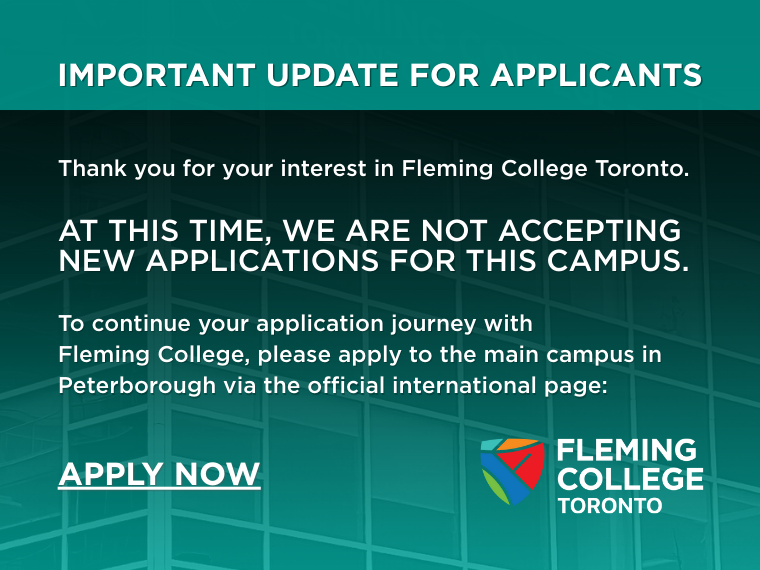From Raw Material to Retail: An Overview of Supply Chain Management – Global Logistics
- May 26, 2022
- Business

“Supply Chain” was once a phrase reserved for academics, industry experts, and logistics students. However, the year 2021 brought with it endless headlines about the supply chain crisis, and the world came to know the connectivity of the global economy. Commerce stretches beyond borders and impacts the lives of consumers across the globe.
Now, there is a large demand for workers with the skills and knowledge to manage the flow of goods and services on a global scale. Fleming College Toronto’s program aims to train graduates that will meet that demand.
In this 1-year graduate certificate program, you will learn to coordinate complex operations for the end-to-end supply chain, from raw material acquisition to retail and consumer. Classes are small and taught by industry-recognized faculty with a mix of lectures and hands-on learning. After graduation, you will be prepared for a variety of career opportunities, including logistics analyst, customs broker, supply chain logistics manager, and more.
What is supply chain management?
Supply Chain Management is an important part of any business, comprising the strategic planning of all activities related to creating, acquiring, producing, distributing, and conveying goods and services to customers. Supply Chain Management aims to ensure the precise delivery of items or services while adhering to the correct location, time, quantity, and cost parameters while maintaining quality standards and minimizing inefficiencies.
What is Global Logistics?
Global Logistics refers to the management and coordination of the flow of information, goods, and resources across international borders. It includes a broad range of operations and procedures used in the global supply chain, such as shipping, storage, inventory control, customs clearance, and information technology systems.
Why study in Toronto?
According to data from the Canadian Supply Chain Sector Council, Toronto alone added approximately 19,000 supply chain jobs between 2014 and 2021. This means this sector’s job market in Toronto has grown by approximately 11%, higher than the national average of 7%.
Toronto is home to various Supply Chain conferences like the World Conference on Supply Chain Management, and the International Conference on Supply Chain Management and Application, a great place for you to get a closer look at the kind of research and discussions that are important and relevant to this field.
Why upgrade to a graduate certificate?
If you are looking to further specialize and push your skills to the next level, this graduate certificate program has a lot to offer.
This program also holds several key advantages for students contemplating a choice between a graduate certificate and an MBA:
- It can be completed faster. MBAs (master's in business administration) often require 16 months or 4 semesters, whereas this graduate certificate can be completed in 8 months or 2 semesters.
- It offers more vocational training, whereas degrees tend to offer more academic-oriented content, preparing students for a career in research or academia.
- Graduate Certificates are more affordable. The cost of this graduate certificate is $16,550 per academic year.
What kind of person is a supply chain manager?
Supply chain management involves what the Federal Reserve Bank of St. Louis calls a non-routine cognitive job, meaning that your tasks may change daily. Supply-chain managers need to think strategically, adapt to changing circumstances, and make quick decisions that have large repercussions. One day you might have to resolve a problem with sourcing, and the next day you might be dealing with distribution or production issues. In the world of logistics, things never get boring.
If this sounds exciting to you, you can explore program details here or send an email to info@flemingcollegetoronto.ca
FAQ
What are the three major functions of Global Logistics?
The three major functions of Global Logistics are transportation, inventory management, and distribution. These three functions work together to ensure products are distributed to the right location and the right time.
What are the basic steps of Supply Chain Management?
Basic steps vary from business to business, but the most common steps are planning, sourcing, manufacturing, delivery, returns, and monitoring.
What are the four C’s of Supply Chain Management?
The four C’s of Supply Chain Management are communication, capacity, coordination, and capacity.
Read more blogs
Client Profiles: Get to Know Your Ideal Audience
Learn about client profiles and how creating one can help your business grow.…
Treat Your Coworkers Like Customers
Learn why customer service skills are valuable for any job…
Achieve Academic Excellence with FCT ELB
Learn how FCT ELB will help you adapt to the Canadian education system and thrive in the classroom.…



